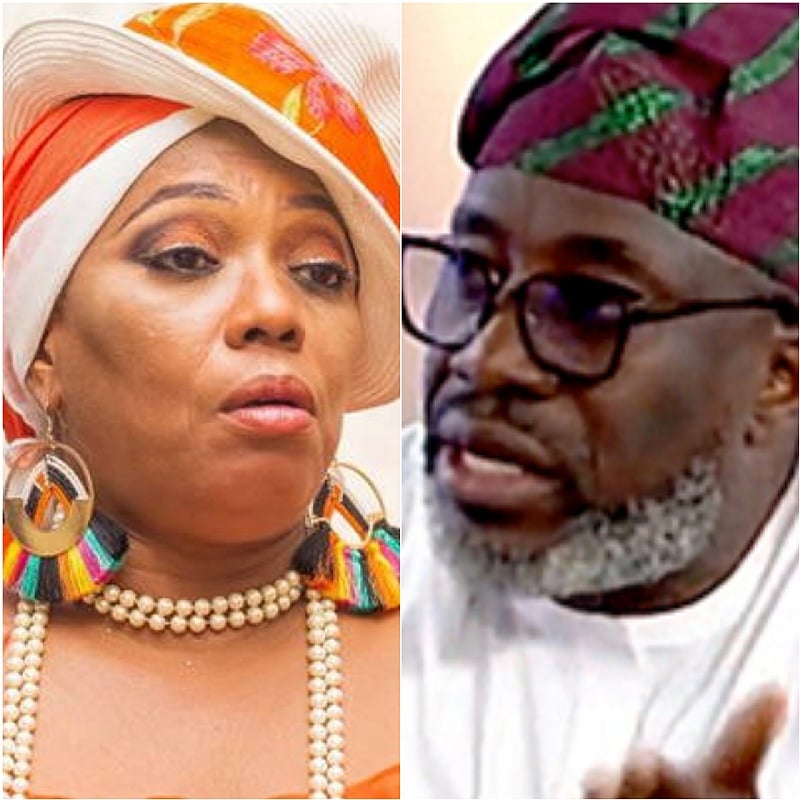The televised clash between media personality Yeni Kuti and Peoples Democratic Party (PDP) chieftain Segun Sowunmi ignited a firestorm of debate, centered around Sowunmi’s recent visit to President Tinubu’s Lagos residence. The encounter, broadcast on TVC’s Your View programme, quickly devolved into a tense exchange, fueled by Kuti’s pointed questions regarding Sowunmi’s seemingly softened stance towards the president, a figure he had previously criticized vehemently. Kuti’s line of inquiry, probing the possibility of Sowunmi switching political allegiances from the PDP to the ruling All Progressives Congress (APC), touched a raw nerve, prompting a defensive reaction from Sowunmi. This on-air confrontation, punctuated by personal jabs and hasty apologies, became a microcosm of the larger political drama unfolding in Nigeria, highlighting the complexities of political loyalty and the public scrutiny that accompanies perceived shifts in allegiance.
The heart of the matter lies in the perceived incongruity between Sowunmi’s past criticism of President Tinubu and his recent visit. This apparent about-face sparked speculation and fueled accusations of political opportunism. Kuti, in her role as a media personality, gave voice to these public sentiments, directly challenging Sowunmi to explain his actions and clarify his political position. Her questions, though direct and potentially provocative, reflected the broader unease and skepticism surrounding Sowunmi’s visit, particularly given the politically charged atmosphere in Nigeria. The public, accustomed to clear lines of political demarcation, struggled to reconcile Sowunmi’s past pronouncements with his present actions.
Sowunmi’s response, initially defensive and bordering on dismissive, further fueled the controversy. His attempt to sidestep Kuti’s questions, coupled with his initial resistance to acknowledging her seniority, only served to amplify the perception that he was evading accountability. This defensive posture, rather than clarifying his intentions, inadvertently reinforced the suspicion that his visit to Tinubu was more than a mere courtesy call. The public, already primed to interpret his actions through a political lens, saw his evasiveness as a tacit admission of a potential shift in allegiance.
The exchange, however brief, exposed the underlying tensions and mistrust that often characterize political discourse in Nigeria. Sowunmi’s visit, irrespective of its true purpose, became a lightning rod for public scrutiny, highlighting the intense scrutiny placed upon political figures and the high expectations of transparency and consistency in their actions. Kuti, by posing the questions that many were thinking, became a conduit for public sentiment, demanding answers and accountability from a political figure whose actions seemed to contradict his past pronouncements.
The subsequent apology from Sowunmi, though seemingly conciliatory, did little to quell the underlying tension. His sudden shift from defensiveness to deference, addressing Kuti as “sister” and “aunty,” was interpreted by some as a strategic retreat, an attempt to diffuse the situation rather than genuinely address the concerns raised. This rapid change in demeanor, while potentially intended to de-escalate the on-air conflict, further fueled the perception that Sowunmi was prioritizing damage control over providing a clear and forthright explanation for his visit to Tinubu.
The incident, though seemingly trivial on the surface, serves as a powerful illustration of the dynamics of political perception in Nigeria. Sowunmi’s visit, regardless of its intended purpose, became a symbol of political maneuvering and potential realignment. The public’s reaction, amplified by Kuti’s pointed questioning, underscored the importance of transparency and consistency in the political sphere. The lingering questions surrounding Sowunmi’s intentions serve as a reminder of the constant scrutiny faced by political figures and the enduring power of public perception in shaping political narratives. This episode, captured in a brief but impactful television exchange, offers a compelling glimpse into the complexities of Nigerian politics and the challenges of maintaining credibility in a highly charged political environment.














